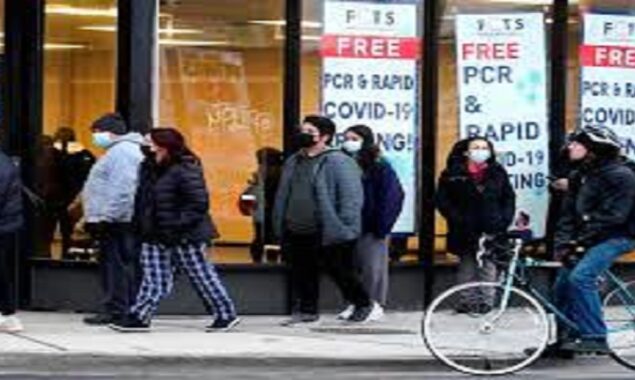
People without health insurance and the clinicians who treat them are among those already left out as a political battle over COVID funding rages on Capitol Hill.
The Senate’s recent announcement of a $10 billion plan to combat the COVID-19 pandemic comes at a time when cases are on the rise in some states and the country is facing a potential new wave of infections from the BA.2 omicron subvariant, which already accounts for nearly three out of every four new cases in the United States.
Even if Congress overcome a stalemate over immigration and adopt the budget agreement, a government programme that reimburses clinicians for diagnosing, treating, and providing immunizations to uninsured Americans has run out of money, and the plan does not include money to continue those efforts.
This will put further pressure on important health-care providers, such as safety-net hospitals and community health centres, which already run on razor-thin margins, and will worsen existing health inequities among the populations they serve.
Melissa Mather, chief communications officer for Family Health Centers, Inc., a nonprofit community health centre based in Louisville, Kentucky, says, “It’s not a fantastic time for us to lose any money.”
According to the agreement’s summary, $5 billion of the planned money will go toward treatments, with another $750 million set aside for vaccine research and development for new variations, as well as vaccine manufacturing.
However, the plan does not include funding for the Health Resources and Services Administration’s uninsured programme, which halted accepting reimbursement claims from health care providers for COVID-19 testing and treatment of uninsured individuals last month “because to a lack of appropriate funds.” The deadline for reimbursement claims related to vaccine administration was this past Tuesday.
The HRSA programme has funded more than $18 billion to help uninsured persons receive access to important COVID-19 treatments, according to Lisa Kidder Hrobsky, senior vice president for federal relations, lobbying, and political affairs for the American Hospital Association. While she supports the latest budget relief plan, she believes it misses a chance to address mounting worries that a reduction in pandemic-fighting resources may hinder continued attempts to vaccinate people in the most vulnerable communities.
“While we appreciate the assistance Congress and the administration have offered hospitals and health systems,” Kidder Hrobsky notes, “we are unhappy that this most recent round of COVID-19 relief does not address longstanding concerns from the hospital field.”
Federal officials have mandated that COVID-19 vaccines be distributed at no cost to the public, despite the fact that the government has already acquired the country’s current supply. While Medicaid coverage can help cover the costs of COVID-19 services for the uninsured in some states, as a Kaiser Family Foundation analysis points out, the reimbursement program’s suspension will put some providers in the position of having to choose between continuing to provide vaccines or services like testing to the uninsured and absorbing the costs, billing for some services as allowed, or simply ceasing to provide services they previously did.
According to the KFF brief, “either way providers respond, the effect will almost certainly be restricted access for uninsured patients in most states due to more limited provider availability and/or potential out-of-pocket expenditures.”
In the Louisville area, where Family Health Centers cooperated with a private testing firm to operate four COVID-19 testing facilities that supplied more than 50,000 free tests, Mather says the program’s suspension has already changed services.
Mather describes the testing company’s interaction with him as positive. The organisation also handled administrative tasks such as paying health insurance and filing reimbursement claims with the Health Resources and Services Administration for testing the uninsured.
“We really looked at that situation and asked ourselves if this was the greatest situation for what we’re trying to do,” Mather says, “which is to offer access in underserved neighbourhoods for low-income folks who may or may not have health insurance.”
As a result, Family Health Centers ended the collaboration and now conducts testing solely within its own many sites, where administrative costs are around $20. According to Mather, the lower costs allow the health centre to give the treatment at a reduced fee or for free to patients who cannot afford it.
“We believed we were at a point where there wasn’t a lot of demand,” Mather says, “and we could take it on and provide greater access to testing at cheaper costs.”
Family Health Centers, according to Mather, are committed to giving immunizations to people regardless of their financial situation. However, she acknowledges that the health centre will need to find other ways to cover administrative costs, which could include getting testing and treatment costs covered through private insurance, Medicare, or Medicaid, or assisting patients in applying for eligibility to pay for those services through the health center’s sliding fee scale.
“We’re not going to leave our neighbours in the lurch,” Mather says, “but we’re not going to lose that extra support.”
The suspension of the payment programme across the country has the potential to generate or exacerbate inequities in communities where access to health care is limited to the local drugstore.
Read More News On
Catch all the International News, Breaking News Event and Latest News Updates on The BOL News
Download The BOL News App to get the Daily News Update & Follow us on Google News.




